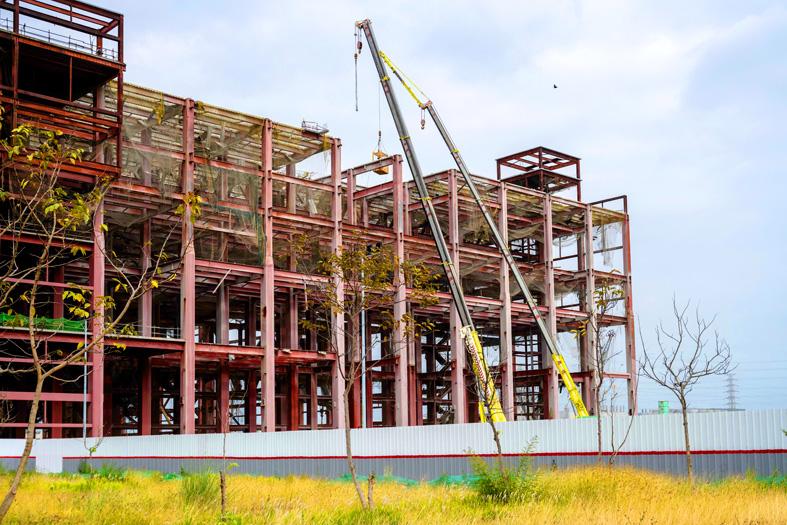US President Biden’s top economic and national security advisers are today to host more than a dozen chief executive officers to discuss the administration’s US$2.25 trillion infrastructure plan and the global semiconductor shortage, a White House official said.
US National Economic Council Director Brian Deese and US National Security Adviser Jake Sullivan are to host the meeting, while US Secretary of Commerce Gina Raimondo is also to participate.
Companies invited to join the administration officials include General Motors Co, Ford Motor Co, Stellantis NV, Google’s parent company Alphabet Inc, Dell Technologies Inc, Intel Corp, Medtronic PLC, Northrop Grumman Corp, HP Inc, Cummins Inc, Micron Technology Inc, Taiwan Semiconductor Manufacturing Co (TSMC, 台積電), AT&T Inc and Samsung Electronics Co.

Photo: Bloomberg
A White House official said that the agenda would include proposals in what Biden calls the “American Jobs Plan” to support the auto industry’s transition to clean energy, the creation of jobs and the preservation of US economic competitiveness.
“The president is deeply committed to ending the silos between domestic and foreign policy — and the semiconductor shortage is a perfect example of an urgent economic and national security priority for the Biden administration,” Sullivan said in a statement. “The shortage is impacting the lives of American workers and families as plants sit idled. And trying to address supply chains on a crisis-by-crisis basis creates critical national security vulnerabilities.”
The Biden administration is in the middle of a 100-day supply-chain review — including for semiconductors — and has called on the US Congress to pass legislation that would fund chips research and development.
The results of the review are not to be made public until June and today’s meeting is to inform the outcome, White House press secretary Jen Psaki said on Thursday last week.
Intel, Samsung and TSMC have all announced plans to build factories in the US, although none of the companies has started construction and the timeline for production at the new plants would potentially be years away.
Deese said that the COVID-19 pandemic exposed economic vulnerabilities, as well as the importance of robust and reliable supply chains.
“This summit reflects the urgent need to strengthen critical supply chains and strategically position the US economy to lead the 21st century, and we look forward to partnering with our key stakeholders in this effort,” he said in a statement.
TSMC told the Central News Agency on Saturday that it planned to join the meeting, although it did not say which executive would attend.
TSMC on Friday posted a record NT$362.41 billion (US$12.76 billion) in revenue in the first quarter, up 16.7 percent from a year earlier.
The company is to hold an investors’ conference on Thursday to detail its first-quarter financial results, as well as its forecast for the rest of this year, and progress on planned chip fabs in Arizona and Japan.
Additional reporting by CNA

Intel Corp chief executive officer Lip-Bu Tan (陳立武) is expected to meet with Taiwanese suppliers next month in conjunction with the opening of the Computex Taipei trade show, supply chain sources said on Monday. The visit, the first for Tan to Taiwan since assuming his new post last month, would be aimed at enhancing Intel’s ties with suppliers in Taiwan as he attempts to help turn around the struggling US chipmaker, the sources said. Tan is to hold a banquet to celebrate Intel’s 40-year presence in Taiwan before Computex opens on May 20 and invite dozens of Taiwanese suppliers to exchange views

Application-specific integrated circuit designer Faraday Technology Corp (智原) yesterday said that although revenue this quarter would decline 30 percent from last quarter, it retained its full-year forecast of revenue growth of 100 percent. The company attributed the quarterly drop to a slowdown in customers’ production of chips using Faraday’s advanced packaging technology. The company is still confident about its revenue growth this year, given its strong “design-win” — or the projects it won to help customers design their chips, Faraday president Steve Wang (王國雍) told an online earnings conference. “The design-win this year is better than we expected. We believe we will win

Chizuko Kimura has become the first female sushi chef in the world to win a Michelin star, fulfilling a promise she made to her dying husband to continue his legacy. The 54-year-old Japanese chef regained the Michelin star her late husband, Shunei Kimura, won three years ago for their Sushi Shunei restaurant in Paris. For Shunei Kimura, the star was a dream come true. However, the joy was short-lived. He died from cancer just three months later in June 2022. He was 65. The following year, the restaurant in the heart of Montmartre lost its star rating. Chizuko Kimura insisted that the new star is still down

While China’s leaders use their economic and political might to fight US President Donald Trump’s trade war “to the end,” its army of social media soldiers are embarking on a more humorous campaign online. Trump’s tariff blitz has seen Washington and Beijing impose eye-watering duties on imports from the other, fanning a standoff between the economic superpowers that has sparked global recession fears and sent markets into a tailspin. Trump says his policy is a response to years of being “ripped off” by other countries and aims to bring manufacturing to the US, forcing companies to employ US workers. However, China’s online warriors